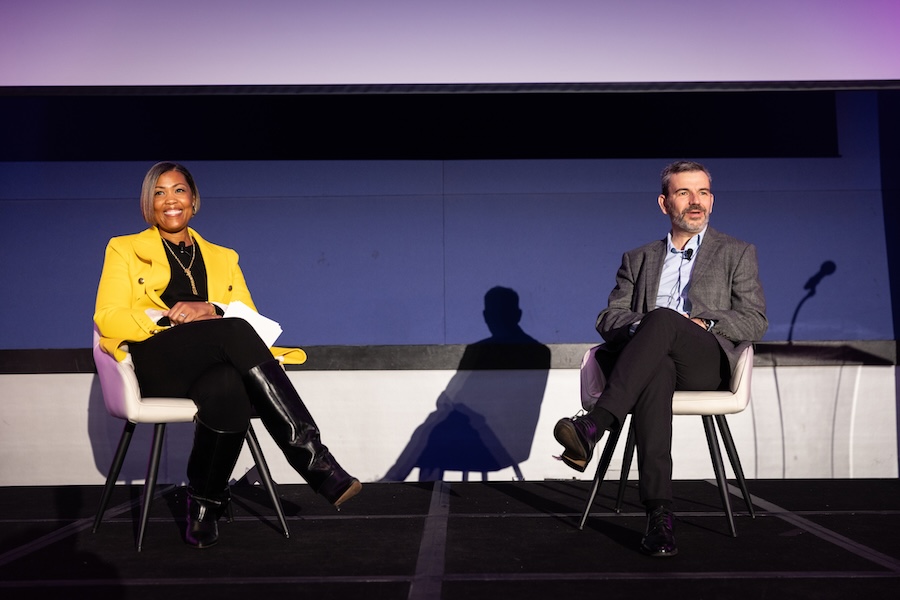Getting Ahead of Attrition Through Career Equity and Recognition


In the age of hybrid work and digital transformation, companies face the challenge of meeting rising employee expectations despite strained profits. Aside from wages, how might companies ensure that their employees’ needs are being met?
At From Day One’s recent Atlanta conference, Jeff Cates, CEO of Achievers and Kumari Williams, VP of belonging and diversity at Workday, discussed exactly this.
According to research from Achievers, the number of people who are job searching in 2024 is going up by 10%. For most people, the number one consideration is wage, which makes sense given today’s cost of living and expenses.
How do we solve the wage problem when most organizations are actually looking to reduce wage increases this year? Research shows that on average, in the U.S., employers are looking at wage increases of about 3.9% in 2024 compared to 4.4% last year.
Emotional salary supports retention. Two-thirds of individuals reported that if they felt supported and connected at an organization, they would take that over a 30% increase in wage.
This cultural environment fosters a strong sense of belonging, increasing the likelihood of individuals pursuing long-term careers within their organization. Belonging creates the difference between ‘I work at an organization’ versus ‘I’m connected; I have a career at this organization.’
Creating a sense of belonging is ultimately what helps create the stickiness that can help offset the lure of wages. For Williams, belonging is an output of inclusivity—and building inclusive spaces and inclusive leaders are the cornerstone workplace belonging.
“It’s even a KPI for our organization. And so at the highest level in the organization, we are focused on increasing belonging, not just maintaining it,” she said.

So, how do you create an environment where people feel connected and fulfilled? At Achievers, equity and transparency are vital in creating employee-friendly talent practices. “Individuals that report a feeling of career equity are two times more likely to not job hunt,” Cates said.
One key area where they dialed in on transparency was performance ratings, where workmates were free to share performance ratings as well as their ratings from a potential standpoint and how they could do better, he says.
It’s time to shift the idea of recognition from a reward to a sustainable practice that nudges people forward. It’s not just about using money (but you can, in small doses), but about using recognition to drive behavior, Cates says. It’s also important to use data to draw relevant insights regarding employee performance and how recognition can further propel that.
“It’s really when we think about recognition that’s not tied to the monetary that we can drive behavior—and if we are going to use monetary rewards, then it should be used in very small doses,” said Cates.
When you think about all the things you can do that drive behavior, such as recognition, gamification, and things that create a sense of accomplishment, it’s important to note that even micro-nudging or micro-rewarding can add up to help build positive habits. By helping to create habits and drive behavior, you can really drive scalable impact on how people feel. By accomplishing smaller tasks and micro-rewarding, you help people achieve a sense of fulfillment and action.
It also comes down to leadership accountability. “Oftentimes, we’re focused on the message at the top of our organizations and making sure that our executives are aware of what we're trying to drive,” said Williams, “and it just doesn't permeate the layers in the middle.”
For Williams, being intentional about how you drive accountability among leaders in the middle of the organization is essential so that they can carry the work forward. Most of your employees’ experience is shaped by your middle managers, not the executives, she says.
Staying competitive in the job market and reducing attrition is challenging, especially now that employees are increasingly focused on finding better wages. However, the one thing that employees do value more than higher wages is company culture, particularly a sense of belonging where they see a path forward career-wise, where they’re being recognized, and feel that they are seen and heard.
Editor’s note: From Day One thanks our partner, Achievers, for sponsoring this thought leadership spotlight.
Keren's love for words saw her transition from a corporate employee into a freelance writer during the pandemic. When she is not at her desk whipping up compelling narratives and sipping on endless cups of coffee, you can find her curled up with a book, playing with her dog, or pottering about in the garden.
The From Day One Newsletter is a monthly roundup of articles, features, and editorials on innovative ways for companies to forge stronger relationships with their employees, customers, and communities.